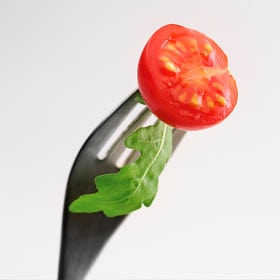Vegan Diet: Is it Right for you?
One of the best pieces of eating advice I’ve come across regarding the Vegan Diet, is from Michael Pollan. He’s one of the most influential and highly regarded food and nutrition activists and experts of our time.
In his book, Food Rules, Pollan sums up 64 food principles to live by in one simple sentence:
“Eat food, not too much, mostly plants.”
In recent years, there’s been a shift toward dietary approaches that emphasize eating more plants, including vegetables, fruit, grains, legumes, beans, nuts, and seeds.
Some people take the plant focus a step further and may adopt a vegetarian or vegan lifestyle. They often give two key reasons for their choice to avoid eating animals: (1) the moral belief that it is wrong to kill and eat animals and a desire to protect them, and (2) the health-centered rationale that animal protein is linked to illness and not designed for human consumption.
So, what’s the key difference between the two?
Vegetarians avoid consuming any animal flesh (meat, fish, chicken, poultry) but may consume milk, milk products, and eggs.
Vegans avoid all products from animals, including animal protein, milk, milk products (cheese, ice cream, butter), and honey (since honey comes from bees!). They also tend avoid other non-food products that are made with or from animals, including leather, wool, and bone. Veganism has its roots in a desire to protect animals, so it’s considered more of a lifestyle than just a way of eating.
Because vegans avoid milk and milk products, they often realize additional benefits.
Countless doctors and nutritionists (check out the list at the end of this article!) agree that drinking cow’s milk is not something humans were designed to do and make several compelling points as to why. In short, milk tends to be an allergenic, mucus-producing, congestion-inducing food.
Personally, I’ve benefited tremendously from eliminating milk and milk products from my diet and found that they are a trigger food for me, causing everything from congestion, sinusitis, allergies and ear infections to bloating, gassiness, and reflux. I used to suffer from all of those symptoms chronically, but since giving up milk, I don’t. It’s been amazing!
On the topic of milk, one of the questions many vegans encounter is, “Where do you get your protein and calcium?”
The easy answer? The same place elephants, gorillas and cows do – from plants, from the Vegan Diet!
According to Dr. Colin Campbell, author of the seminal China Study, leafy green vegetables, beans, nuts and seeds are all great sources of protein and calcium.
Deficiencies of Vitamin B12 are another concern among non-animal eaters, but plants provide B12 as well. Oatmeal, sea vegetables like nori, fermented soy products like tempeh and miso, and fermented foods like sauerkraut, kimchi, and pickles are all plant-based sources of B12.
Not vegan or vegetarian? You can still benefit from upgrading your diet and adding in more plants to crowd out other foods that are not nourishing you.
Plants are loaded with nutrients, including vitamins, minerals, disease-fighting and anti-aging antioxidants and phytochemicals, and “fill-you-up” fiber. Think of eating plants (especially vegetables) as getting the most “bang” for your calorie buck!
We need to eat plants to get fiber. Fiber is not found in animal products but is something we need for healthy digestion, sustained energy, and regular waste elimination.
Plants help our bodies reduce inflammation (what Dr. Mark Hyman refers to as “a smoldering fire inside your body”). Inflammation is at the core of the surge in obesity and chronic disease and is caused by our processed sugar/oil/fat intake; physical inactivity; chronic stress; and even hidden food allergies.
Plants (especially vegetables) are detoxifying, which means they help our bodies “clean out” the toxins that are keeping us sick and overweight. Leafy green vegetables are especially effective at helping our body “detox.”
Last spring when I was first learning about the ins and outs of vegetarianism and veganism, I tried the free 21-Day Vegan Kickstart program through the Physicians Committtee for Responsible Medicine (PCRM).
Their site is a great resource for additional information about animal-free diets, and their program includes lots of great resources, recipes, and helpful tips for going plant-based.
Regardless of your particular food philosophy or diet, one thing just about every nutrition expert agrees on is that we should eat real, whole, fresh, unprocessed food with an emphasis on foods that are seasonal, local, and raised or grown without harmful chemicals.
For some people that food includes animal products, and for others, it doesn’t. And that’s okay. Both people can be healthy.
I just finished reading Annemarie Colbin’s book, Food and Healing, and loved her common sense advice about listening to your body and eating what works best for you: “Sticking to a diet that doesn’t work for you is pointless, regardless of its objective validity, scientific basis, or philosophical justness; regardless, too, of the conviction, clarity, credentials, or rhetoric of its proponents.”
Learn to listen to your body and how it responds to food, especially when using the Vegan Diet.
You’re the only person who can really tell you if you feel better eating a certain way. Know your body. Trust your body. Make your own decisions and be your own best expert.
It’s about figuring out what works for you.
If you’d like to learn more about
plant-based diets, check out the following resources then
contact us:
Books
Crazy, Sexy Diet by Kris Carr
Eat to Live by Dr. Joel Fuhrman
The Kind Diet by Alicia Silverstone
Thrive by Brendan Brazier
The China Study by Dr. T. Colin Campbell
Main Street Vegan by Victoria Moran
DVDs
Vegucated
Forks Over Knives
Food, Inc.
Food Matters



